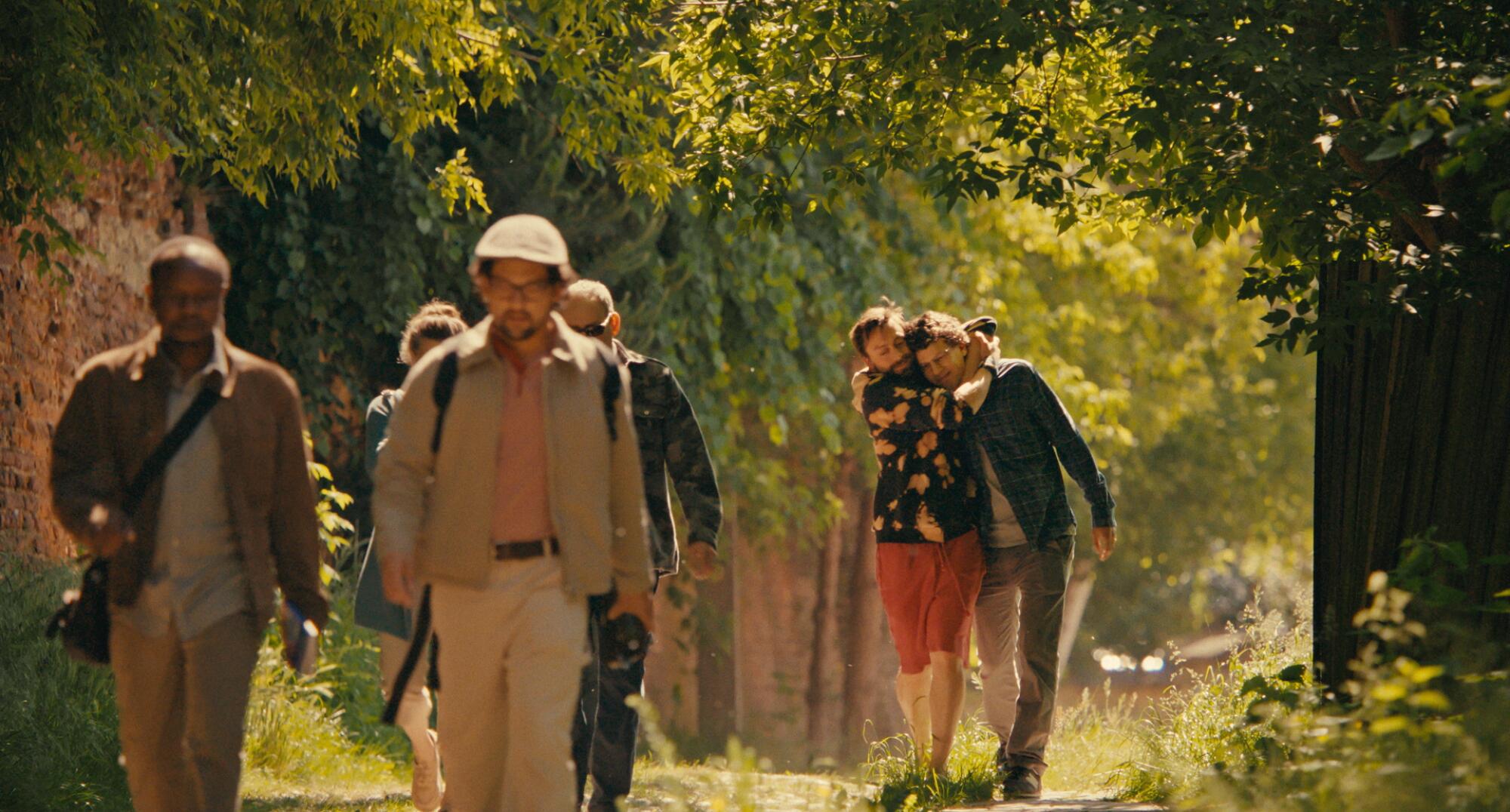
It took a parenthetical phrase on an online ad to sharpen into focus the disparate ideas that Jesse Eisenberg was pulling together while writing what would become his second feature film as director, “A Real Pain.”
It was an ad for a Holocaust tour that touted in parentheses “with lunch.”
“And I thought, that’s what these two characters should be going on,” Eisenberg explains, his cadence picking up speed as his mouth works to keep up with his brain. “They should be going on a Holocaust tour, essentially a middle-class suburban American Holocaust tour. You can put these guys who are going through their own existential, interpersonal difficulties against the backdrop of real historical tragedy. And now you have a movie that can support these kinds of problems because it can be buttressed by something so much bigger.”
As Eisenberg talks, he often stops and backs up and restarts a phrase, as if there is a pencil in his mind that edits his dialogue as he is speaking.
“And you could also make commentaries on tragedy tourism and how you want to visit a concentration camp by day, but stay in a Radisson [hotel] at night,” he continues. “And just the irony of going on a train and sitting first class to go to a concentration camp where literally your ancestors would’ve been herded into cattle cars and half of them dying on the way over to that same camp.”
Told with a seriocomic touch, “A Real Pain” (in theaters Nov. 1) explores the true depths that underlie petty family squabbles and minor concerns in the face of larger tragedies and emotional maelstroms, with a sensitive eye for both acute details and the bigger picture.
Eisenberg plays David, a married New Yorker with a young son and a mid-level advertising job. He and his cousin Benji — brought to life in an achingly vibrant performance by Kieran Culkin — were like brothers when they were younger, but have drifted apart in adulthood. Benji, something of a chatty drifter, has never quite found himself, at least not by David’s standards. After the death of their beloved grandmother, they take a trip to Poland to visit historical sites of the Holocaust, see their family’s one-time home and reconnect in ways neither could anticipate.
To talk about “A Real Pain,” Eisenberg recently joined a Zoom call from Hungary, where he is shooting the third film in the successful “Now You See Me” franchise in which he stars as part of a group of criminal magicians. (“It’s going well and quite different from the movie we’re talking about,” reports Eisenberg.)
Three Sundance entries — Jesse Eisenberg’s “A Real Pain,” Titus Kaphar’s “Exhibiting Forgiveness” and Aaron Schimberg’s “A Different Man” — straddle art and life.
“A Real Pain” pulls together a number of threads both personal and professional for the actor. Eisenberg once told his great aunt, with whom he was quite close, that if he ever shot a movie in Europe he would visit their family’s former house in Poland where she lived as a girl. So in 2008, while shooting “The Hunting Party” in Bosnia, he went there.
“My wife and I went to pretty much all of the things that the characters do in the movie,” says Eisenberg, 40.
That experience, including meeting cousins still living in Poland, was the inspiration for Eisenberg’s 2013 play “The Revisionist,” in which he performed opposite Vanessa Redgrave, exploring many of the same themes as what would become “A Real Pain.” He also wrote a short story, “Mongolia,” published in Tablet magazine in 2017, about two guys traveling together who have an existential crisis.
Filtering all that through the character of Benji gave Eisenberg exactly what he needed.
“I could have this character who’s this kind of live-wire nihilist, calling them out at every moment on their hypocrisy,” Eisenberg says. “And so it just seemed like, oh, this is a perfect setup for a feature film.”

When “A Real Pain” premiered earlier this year at the Sundance Film Festival, it was picked up by Searchlight Pictures for a reported $10 million, won the Waldo Salt screenwriting award and was greeted with near-unanimous praise. That was a big shift from Eisenberg’s previous film as writer-director, 2022’s “When You Finish Saving the World,” which left many viewers cold in its depiction of the tense relationship between a mother and her teenage son.
Eisenberg recalls that while editing his first film, he showed it to a high-profile editor who subsequently called him up and yelled at him for over an hour that his characters and story never allowed an audience in.
“I realized this is probably going to be a recurring theme,” Eisenberg recalls. “I could just tell. The certainty with which he eviscerated me indicated that this is not going to be a one-off opinion.”
So when he set out to write his next project, he kept that feedback in mind.
“I started this with a very explicit intention of making characters that are more clearly relatable and sympathetic,” Eisenberg says. “I would’ve probably done something slightly more caustic.”
Eisenberg made sure to take in the lessons of his first film as he was moving on to make his second. “I do learn, but I wasn’t learning necessarily what to do better,” he says. “What I was learning is what audiences are open to. And to me, my first movie is exactly what I wanted to do. And the fact that a lot of people didn’t take to it is as surprising to me as people liking this new one.”
Both of Eisenberg’s films have been produced by Fruit Tree, the production company run by Emma Stone, her husband Dave McCary and producer Ali Herting. Eisenberg and Culkin first met when Culkin was dating Stone and came to visit the production of the 2009 horror-comedy “Zombieland,” in which Stone and Eisenberg co-starred.
“I just remember really truthfully thinking, wow, this is the nicest actor of my generation,” says Eisenberg, “because when I first met him, he had seen me in ‘The Social Network’ and said the nicest thing to me. And I remember just thinking, ‘Oh my God, it’s so unusual that from a peer, you’d get this completely unegotistical compliment.’ ”
Jesse Eisenberg, Kieran Culkin, Jennifer Grey and Will Sharpe came by the L.A. Times Studios at Sundance Film Festival presented by Chase Sapphire, to talk about their film, ‘A Real Pain.’
While writing “A Real Pain,” Eisenberg initially thought he would play the part of Benji, but his producers convinced him that the emotional extremes of the character might be too much while he was also directing. It was his wife and his sister who both suggested Culkin for the part.
Speaking from Brooklyn by phone (he’s in a car en route to a screening of the film), Culkin recalls that it is one of the only scripts that made him properly laugh out loud when he first read it. And also that he recognized the behavior of Benji.
“It is so exactly like someone I know,” says Culkin, soon to turn 42. “How did he get in that guy’s head? One comment I’ve heard from people that have seen the movie is, ‘Oh, I have a Benji in my life.’ I’m like, ‘You know him too? Is it the same as mine?’ ”
When Culkin and Eisenberg were together to promote the film at Sundance, the dynamic between them was startlingly close to the dynamic between Benji and David, in that there was obviously deep affection and respect, but also a needling undercurrent. They each knew just how to drive the other one a little nuts.
“When we started working, there was an immediate rapport — something worked right away,” says the “Succession” star. “We really got to know each other by being these characters and by wanting this thing to work.”
“Kieran has just a natural ability to be loved,” Eisenberg says. “I told him on the second or third day of shooting, you hear all these horrible stories of these lech directors falling in love with their young ingenues, and I was like, ‘I feel like I’m having that for you. You’re just the most lovable, brilliant, charming, interesting, enigmatic, mean but also sweet and bold but pathetic character.’ And he just projects all of this because he’s just one of these people who’s totally in touch with himself.”
As David and Benji go about their trip with other tourists — the film’s cast includes Will Sharpe as their guide and Jennifer Grey, Daniel Oreskes, Liza Sadovy and Kurt Egyiawan as fellow travelers — they eventually make their way to Poland’s Majdanek concentration camp, a deeply stirring sequence in the film. (Some of the Polish producers and crew on the film had also worked on Jonathan Glazer’s Holocaust drama “The Zone of Interest,” which shot at Auschwitz.)

Once the production was able to secure permission to shoot at the camp, the practicalities of making a movie set in. How will the gaffer run cables to power the lights to shoot inside a gas chamber? Where will actors have their hair and makeup done? Where will the crew eat lunch?
“It’s a thing I never thought I would be thinking about or standing in,” says Eisenberg. “And everybody is incredibly reverential. These are Polish people. This happened on their land. They’ve grown up to be incredibly reverential of this history.
“And I just had this simultaneous feeling of like, this is so awkward that we’re trying to think of these practical, cinematic applications for this place of great historical tragedy. And then my next thought was, ‘Wait a second, this is like the most beautiful thing, that this Polish crew is so sweetly, generously trying to find ways to make my imagination come to life, to honor my family.’ ”
Eisenberg continues revising his thoughts and feelings to realize, “And how beautiful this thing that we’re doing here is, that it will tell a story and will show a place that a lot of people now don’t believe existed. And so then it became, for me, this really amazing gift that I was getting from both the people who worked there and this Polish crew who were made to go to this very uncomfortable place for a day of shooting.”
It is perhaps the film’s greatest achievement that it alternates between two cousins being annoyed with each other and contemplating the enormity of global tragedy. “A Real Pain” consistently exists at a relatable scale. Along those lines, that is indeed Eisenberg’s own son Banner who is glimpsed briefly as David’s son in a few moments throughout the film. Their onscreen FaceTime conversations mostly revolve around the young boy’s obsession with the heights of buildings.
“That was like four obsessions ago,” says Eisenberg, noting his son’s interests have since moved on to cooking and magic.
Once he’s done with production on “Now You See Me 3,” Eisenberg will move on to directing another film of his own, again produced by Fruit Tree, based on his play “Happy Talk,” another examination of cross-cultural dynamics. And while there is another role for his son, Eisenberg says, “He knows he’s having a smaller role in my next movie and already, I would say, lightly resentful.”
As “A Real Pain” so gracefully explores, with family, it’s always something.
More to Read
Only good movies
Get the Indie Focus newsletter, Mark Olsen's weekly guide to the world of cinema.
You may occasionally receive promotional content from the Los Angeles Times.














